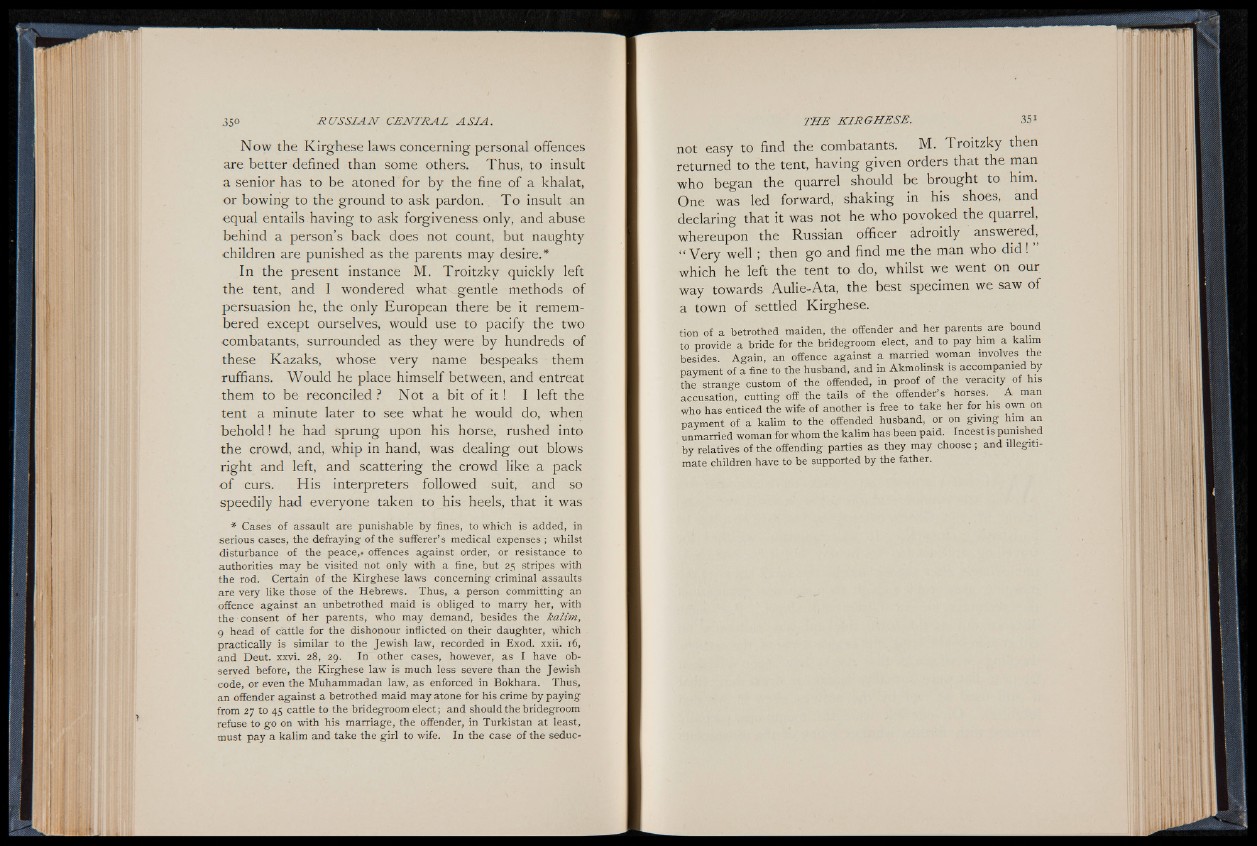
Now the Kirghese laws concerning personal offences
are better defined than some others. Thus, to insult
a senior has to be atoned for by the fine of a khalat,
or bowing to the ground to ask pardon. T o insult an
equal entails having to ask forgiveness only, and abuse
behind a person’s back does not count, but naughty
children are punished as the parents may desire.*
In the present instance M. Troitzky quickly left
the tent, and I wondered what gentle methods of
persuasion he, the only European there be it remembered
except ourselves, would use to pacify the two
combatants, surrounded as they were by hundreds of
these Kazaks, whose very name bespeaks them
ruffians. Would he place himself between, and entreat
them to be reconciled ? Not a bit of i t ! I left the
tent a minute later to see what he would do, when
behold! he had sprung upon his horse, rushed into
the crowd, and, whip in hand, was dealing out blows
right and left, and scattering the crowd like a pack
o f curs. His interpreters followed suit, and so
speedily had everyone taken to his heels, that it was
* Cases of assault are punishable by fines, to which is added, in
serious cases, the defraying' of the sufferer’ s medical expenses ; whilst
disturbance of the peace,» offences against order, or resistance to
authorities may be visited not only with a fine, but 25 stripes with
the rod. Certain of the Kirghese laws concerning criminal assaults
are very like those of the Hebrews. Thus, a person committing an
offence against an unbetrothed maid is obliged to marry her, with
the consent of her parents, who may demand, besides the kalim,
9 head of cattle for the dishonour inflicted on their daughter, which
practically is similar to the Jewish law, recorded in Exod. xxii. 16,
and Deut. xxvi. 28, 29. In other cases, however, as I have observed
before, the Kirghese law is much less severe than the Jewish
code, or even the Muhammadan law, as enforced in Bokhara. Thus,
an offender against a betrothed maid may atone for his crime by p aying
from 27 to 45 cattle to the bridegroom elect; and should the bridegroom
refuse to go on with his marriage, the offender, in Turkistan at least,
must pay a kalim and take the girl to wife. In the case of the seducnot
easy to find the combatants. M. Troitzky then
returned to the tent, having given orders that the man
who began the quarrel should be brought to him.
One was led forward, shaking in his shoes, and
declaring that it was not he who povoked the quarrel,
whereupon the Russian officer adroitly answered,
u \l^ry well j then go and find me the man who d id !
which he left the tent to do, whilst we went on our
way towards Aulie-Ata, the best specimen we saw of
a town of settled Kirghese.
tion of a betrothed maiden, the offender and her parents are bound
to provide a bride for the bridegroom elect, and to pay him a kalim
besides. Again, an offence against a married woman involves the
payment of a fine to the husband, and in Akmolinsk is accompanied by
the strange custom of the offended, in proof of the veracity of his
accusation, cutting off the tails of the offender’ s horses. A man
who has enticed the wife of another is free to take her for his own on
payment of a kalim to the offended husband, or on giving him an
unmarried woman for whom the kalim has been paid. Incest is punished
by relatives of the offending parties as they may choose ; and illegitimate
children have to be supported by the father.